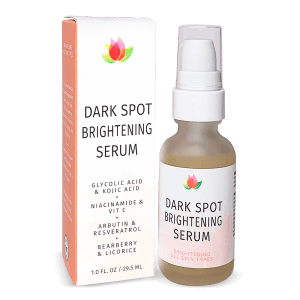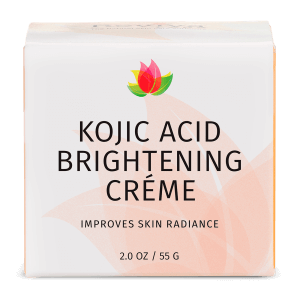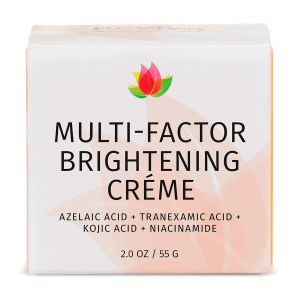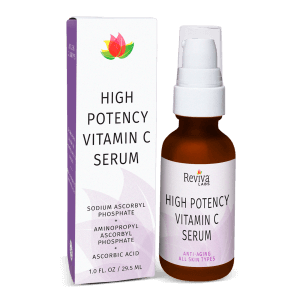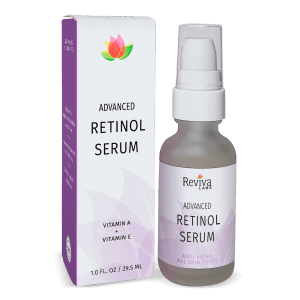Natural, Reviva Labs, Skin Care
How to Brighten Skin Tone
Many people aspire to achieve a brighter skin tone, often desiring a more radiant and healthy-looking complexion. It’s essential to recognize that a variety of factors, such as genetics, environmental influences, and personal lifestyle choices, play a significant role in determining skin tone. To successfully enhance skin brightness, you should focus on an integrated approach that includes a dedicated skincare regimen, positive lifestyle adjustments, and, where appropriate, specialized professional treatments.
Understanding Skin Tone and Brightness
Before diving into how to brighten your skin, it’s crucial to understand what influences skin tone. Melanin, the pigment that gives skin its color, plays a significant role. Factors like sun exposure, hormonal changes, and certain skin conditions can affect melanin production, leading to variations in skin tone. Additionally, skin brightness can be impacted by dehydration, poor diet, and lack of sleep, which can make the skin appear dull and lifeless.
Effective Skincare Routine
A consistent and effective skincare routine is vital for maintaining and enhancing skin brightness. Cleansing, exfoliating, moisturizing, and protecting the skin from the sun are fundamental steps.
- Cleansing: A gentle cleanser helps remove dirt, oil, and makeup, preventing clogged pores and dull skin.
- Exfoliation: Regular exfoliation removes dead skin cells that can make the skin appear lackluster. However, it’s important to choose a product that is not too harsh to avoid skin irritation.
- Moisturizing: Hydration is key to maintaining a bright, healthy-looking complexion. A good moisturizer helps keep the skin plump and radiant.
- Sun Protection: UV rays from the sun can cause hyperpigmentation and an uneven skin tone. Using a broad-spectrum sunscreen daily is crucial in protecting the skin and maintaining its brightness.
Targeted Skincare Products
Incorporating targeted skincare products can be a game-changer in brightening the skin. Products like Reviva Labs’ Dark Spot Brightening Serum are formulated to address specific concerns like dark spots and uneven skin tone. This serum, rich in natural ingredients (featuring eight brighteners: 5% Niacinamide, 1% Glycolic Acid, 1% Kojic Acid, 1% Arbutin, Vitamin C, Resveratrol, Bearberry, and Licorice Root), works to reduce the appearance of dark spots and brighten the overall complexion.
Another excellent product to consider is Reviva Labs’ Multi-Factor Brightening Creme. This cream is designed to not only brighten the skin but also provide hydration and anti-aging benefits. Its multifaceted approach, combining 10% Azelaic Acid, 5% Niacinamide, 3% Kojic Acid, 3% Tranexamic Acid, ensures that the skin is not only brighter but also healthier and more youthful looking.
Diet and Lifestyle for Brighter Skin
What we eat and how we live our lives significantly impact our skin’s health and appearance. A diet rich in fruits, vegetables, and antioxidants can help fight free radicals that dull the skin. Staying hydrated by drinking plenty of water is also essential for maintaining skin brightness.
Sleep and stress management are equally important. Lack of sleep can lead to a tired-looking complexion, while high stress levels can trigger skin issues like breakouts and dullness. Ensuring adequate sleep and practicing stress-reduction techniques like meditation can have a positive effect on your skin’s appearance.
Professional Treatments
For those seeking more dramatic results, professional treatments can be an option. Treatments like chemical peels, laser therapy, and microdermabrasion are effective in treating hyperpigmentation and improving skin brightness. These treatments should be done under the guidance of a skincare professional to ensure safety and effectiveness.
Natural Remedies
In addition to commercial products and treatments, there are natural remedies that can help brighten the skin. Ingredients like lemon juice*, honey, and yogurt have properties that can lighten the skin and improve its texture. However, it’s important to use these remedies with caution, as some ingredients can be too harsh for certain skin types.
*Exercise caution when using citrus on your skin, especially if you plan to be in the sun. This is because citrus can lead to phytophotodermatitis, a condition that typically shows symptoms 24 to 48 hours after sun exposure. Initially, patients might experience a burning sensation and redness of the skin, followed by blister formation. Phytophotodermatitis can provoke intense reactions like sunburns, rashes, hives, and blistering. However, not everyone is affected by this condition; some may not react at all even if they encounter juice from these fruits. People who are particularly susceptible to sunburn should be especially vigilant and take protective measures.
Avoiding Harmful Practices
It’s critical to avoid harmful practices that can damage the skin and lead to an uneven skin tone. Harmful practices include, but are not limited to:
- Tanning: Excessive exposure to the sun or the use of tanning beds can lead to premature aging, hyperpigmentation, and an increased risk of skin cancer. The ultraviolet (UV) rays can break down collagen, resulting in fine lines and wrinkles, and can also trigger the overproduction of melanin, which leads to dark spots and an uneven skin tone.
- Using Harsh Skincare Products: Products with harsh chemicals, excessive alcohol content, or abrasive textures can strip the skin of its natural oils and disrupt the skin barrier. This can cause irritation, dryness, redness, and flaking, leading to an inconsistent skin tone and texture. It’s important to choose skincare products that are suitable for your skin type and to avoid those with ingredients that are known to be overly aggressive or irritating.
- Smoking: Smoking cigarettes has a significant adverse effect on the skin. It restricts blood flow, depriving the skin of essential nutrients and oxygen. This can lead to a dull, sallow complexion and exacerbate the appearance of fine lines and wrinkles. The harmful chemicals in tobacco smoke can also damage collagen and elastin, key components that maintain the skin’s elasticity and firmness, leading to premature aging and uneven skin tone.
Additionally, other harmful practices include:
- Poor Diet: A diet lacking in essential vitamins and nutrients can leave the skin looking dull and lifeless. Foods high in sugars and fats can contribute to breakouts and an uneven complexion.
- Lack of Hydration: Not drinking enough water can dehydrate the skin, making it look dry and dull. Proper hydration helps maintain the skin’s elasticity and brightness.
- Insufficient Sleep: Lack of adequate sleep can lead to dark circles and a tired-looking complexion. Sleep is crucial for the skin’s repair and rejuvenation process.
By avoiding these detrimental practices, one can significantly improve their skin’s health and appearance, promoting a more even and radiant skin tone. Adopting a lifestyle that supports skin health is just as important as following a good skincare routine.
Regular Skin Checkups
Regular consultations with a dermatologist are a key component in maintaining overall skin health and addressing any concerns at an early stage. Dermatologists are medical professionals specializing in skin care, equipped with the knowledge and tools to diagnose and treat a wide range of skin conditions. By scheduling periodic check-ups, you can ensure that your skin receives the appropriate care and attention it needs.
- Personalized Skincare Advice: A dermatologist can offer customized recommendations based on your skin type, concerns, and goals. They can suggest specific products or routines that are most effective for your unique skin, helping you avoid trial and error with over-the-counter products.
- Early Detection and Treatment of Skin Issues: Regular visits to a dermatologist enable early detection of skin issues such as acne, eczema, psoriasis, or more serious conditions like skin cancer. Early detection often leads to more effective treatment and better outcomes.
- Access to Professional Treatments: Dermatologists provide access to a range of professional skin treatments that aren’t available over the counter. These include chemical peels, laser therapy, and prescription medications, which can be more effective in addressing specific skin concerns.
- Guidance on Skin Health Maintenance: Dermatologists can educate you on how to maintain healthy skin over time, including sun protection, proper nutrition, and lifestyle habits that positively or negatively impact skin health.
In addition to dermatologists, consulting with aestheticians can also be beneficial for your skin care regimen. Aestheticians, while not medical doctors, are trained professionals specializing in skin care treatments and beauty services. They offer a different, yet complementary, perspective to dermatologists:
- Customized Facial Treatments: Aestheticians are skilled in providing facial treatments tailored to your skin’s needs. They can offer services like facials, exfoliation, and masks that cleanse, hydrate, and rejuvenate the skin.
- Guidance on Everyday Skincare: Aestheticians can offer practical advice on daily skincare routines, product selection, and application techniques. They are knowledgeable about a variety of skincare products and can help you navigate through the vast options available.
- Non-Medical Skin Care Solutions: For those looking for non-medical approaches to skin care, aestheticians can provide a range of solutions. They often utilize different methods and products that focus on the holistic well-being of the skin.
- Relaxation and Stress Relief: Aesthetic treatments often include elements of relaxation and stress relief. These treatments can provide a calming experience, which is beneficial for both mental well-being and skin health.
Combining the expertise of both dermatologists and aestheticians can offer a comprehensive approach to skin care. While dermatologists focus on the medical health of your skin, aestheticians can enhance your skincare routine with specialized treatments and practical advice. Together, they can help you achieve and maintain a healthy, radiant complexion.
Take a Holistic Approach
In conclusion, brightening your skin tone involves a holistic approach, incorporating a proper skincare routine, a healthy lifestyle, and, when necessary, professional treatments. Products like Reviva Labs’ Dark Spot Brightening Serum and Multi-Factor Brightening Creme can be beneficial in achieving a brighter complexion. Remember, the key to radiant skin is consistency and care in your skincare and lifestyle choices.







